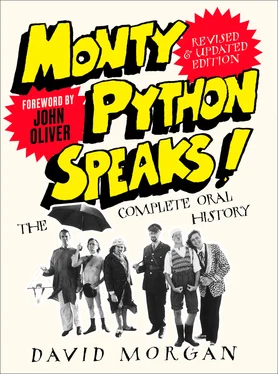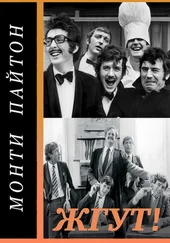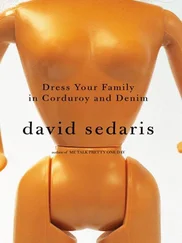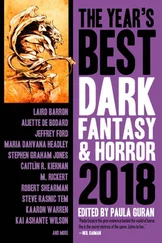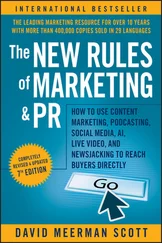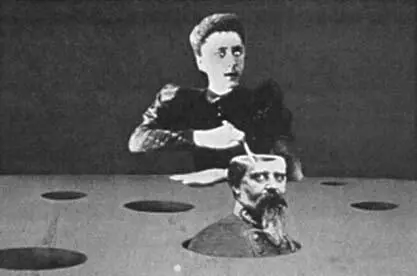
Cannibalism, Gilliam-style.
All the underground press were convinced I was an acidhead, they thought all of us were on drugs but me in particular, and we weren’t – it’s all natural stuff!
And it’s not like a Disney cartoon where everything’s planned and drawn; it’s using things around me, and just incorporating and letting it grow organically.
I was producing this stuff in two weeks [for each show]. Some of the [location] filming I wouldn’t get to because I was desperately trying to get ahead. I’d have to keep up with the shows, so by the end of the series it was always a mad rush. It was weird.
When you sail in a race, you just go out on the ocean, and you come around a buoy and all the boats are there, and before you get to the next marker everybody disperses and goes a different way; suddenly you’re alone. And then you come to the next marker buoy and Oh! Everybody converges. And it was kind of like that in doing the shows; we’d have the meetings, I’d be there as part of the group, then I’d go off into my world, and we’d only get together the days the shows were being recorded. So they were always together, they were always at rehearsals. My problem was there was one side of me that wanted to be a performer as well, but I really didn’t think I was in their class, so I’d just turn up on the days we were recording and take that little part there, put on a costume, do something silly there, just to keep myself both from being bored and feeling more a part of the thing. Because they were having all the fun, and I felt I was doing all the work!
In story meetings, would you ever bring a fully devised sketch to be animated, such as ‘The House Hunters’ [in which two hunters armed with ‘condemned’ posters track a wild building]?
GILLIAM:I wouldn’t have brought it in as a sketch – I would bring it as an idea. ‘I want to do this whole thing about house hunters, it’s a literal thing.’ And again they didn’t know quite where to put those things because they couldn’t imagine them; that was part of the problem. If I wanted to do that little story, in a sense it was up to me to find the right spot to slide that in. I’m trying to remember whether I would actually say, ‘I’ve got a thing that’s probably going to run about three minutes.’ I honestly can’t remember whether I was ever that specific. Because we’d try to work out a thirty-minute show, so I’m sure I must have been saying ‘a big chunk’. ‘I’ve got a big thing to do here,’ something specific!
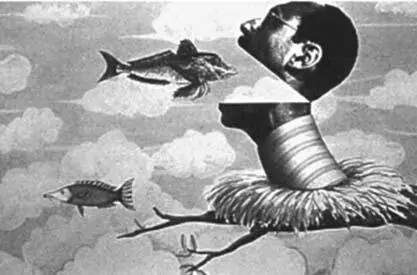
A typical magpie approach.
Terry always loved what I was doing, and Mike. It’s so weird because Terry and Mike are much more visually oriented than the others, but it may just have been my inability to explain things. John I think was constantly bemused by my stuff, he was so – ‘intimidated’ is probably too strong a word, but he didn’t know how to criticize it, so he never criticized it except for this one thing where he could actually go, ‘Well, that’s blasphemous,’ or ‘That’s offensive.’ [ See page 146. ]
That was the bad side of it: I felt at times I wasn’t getting any of the benefit of the criticisms of the group. We all had to be self-criticizing, saying, ‘That doesn’t work,’ ‘That’s not good enough for the shows.’ But a lot of times I never got a sense that they knew whether [what I did] was good or bad, whether it worked or didn’t work, because it was another language that they don’t understand. John didn’t understand the language.
In the English language there’s no word for ‘visual illiteracy’. You have ‘illiterate’, but visual? There’s no term for it; it’s the idea that visual things are not a language. There is a visual language, and yet people who invent words don’t invent that word. I want to use ‘ivvisualites’, people who are visually illiterate.
It’s a thing that intrigues me, the information you get from images; they’re saying things and they’re telling these stories and they don’t necessarily have to be words. Being down with these kids at the Royal College’s Animation Department, some of the stuff they’re doing is just wonderful, but if you sit down and go, ‘Tell me the story,’ they can’t do it. A splotch of stuff here, a funny little noise happens there, what’s that ? And yet it’s fantastic – at least it is for me. I look at some of their stuff and I’m not sure that John Cleese would find it funny, I don’t think he would know what to say about it. Sounds like I’m picking on John, but he was the most visually illiterate; I think it’s that. But I wish the others would have been able to come up and say, ‘Terry, that’s pretty weird.’ They didn’t!
Was any animation ever rejected out of hand?
GILLIAM:There was this thing that Ian MacNaughton just completely fucked up because he didn’t understand it, and Terry hadn’t been in the editing room that day. It was a strange abstract thing – it’s really hard to describe! I mean, it was like trees growing and reaching barriers in space you can’t see, and then they go around and did all sorts of really strange and interesting things. And I don’t know what he was thinking when he did it, he just didn’t get what it was and he cut it. That was a big mistake, [but] that wasn’t like somebody censoring.
CAROL CLEVELAND, ACTRESS:I had been doing a fair amount of work at the BBC, doing what I call – I think this is my own definition – a ‘glamour stooge’, working alongside people like Ronnie Corbett, Ronnie Barker, and Spike Milligan.
When the Pythons were starting, I hadn’t met any of the fellas at all, though I knew a little of their work. They’d written five episodes of the original thirteen, and they were looking for a female. Somebody at the Beeb suggested my name and John Howard Davies saw me and cast me. I hadn’t realized at that stage that my contract wouldn’t go further than four episodes; I only discovered that when my agent got in touch with the Beeb. By this stage we’d got going and I got on extremely well with the guys, they thought I fitted in beautifully. I think they were more than happy with my contribution, and when Michael came up to me when we were doing episode three and said, ‘Oh, we have got something great for you coming up,’ – because already they felt that they weren’t quite utilizing my talents enough and they wanted to give me something more to do than just giggle and smile, as I did in the ‘Marriage Guidance Counsellor’ sketch – I said, ‘Well, it sounds great but I’m not in episode six.’ And he said, ‘What? What?’ And he went over and spoke to the others, John came over and said, ‘What’s this ?’
So they said, ‘Absolutely no way – we want you with us for the rest of the series.’ So that’s what happened. I really owe it to the fellas that I became the Monty Python girl because they put their foot down. 1
By now Ian MacNaughton was doing the directing. Ian wanted to have different ladies in each episode and he wanted to be responsible for the casting, so the fellas put their foot down and said, ‘Uh-uh.’ They came to the agreement that if Ian wanted someone to just literally stand there and say nothing and just look pretty, fine, he could cast that, but if there was any sort of acting involved, the fellas wanted me. And that was the agreement they came to and that was how I came to be in the series.
Читать дальше
